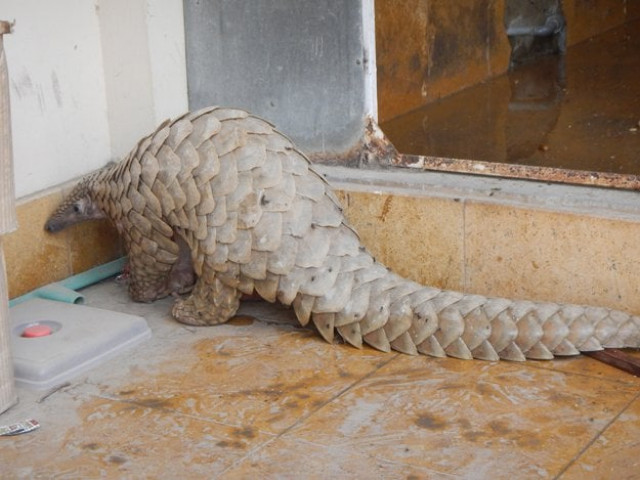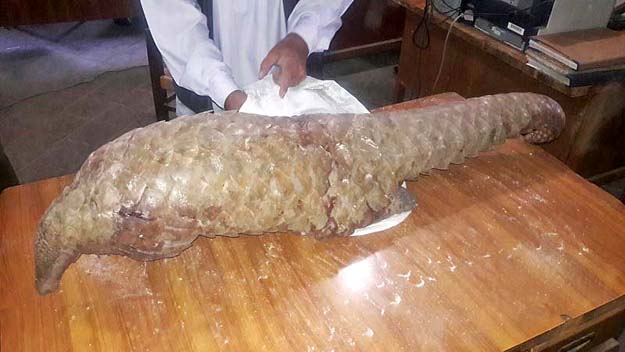Chinese appetite for pangolins threaten their numbers
Pangolin meat is being sold in the local market as people coming from China like it, authorities say

The mammal is the most trafficked animal in the world: WWF. PHOTO: COURTESY: WWF-PAKISTAN
Authorities say that pangolin meat is being sold in the local market, as people coming from China like it.
A large number of Chinese people are staying in Karachi, working on projects related to the China Pakistan Economic Corridor.
But these allegations have never been formally investigated or proven.
International concern over the pangolin, the most trafficked animal in the world, is revealing new data about trafficking of pangolin parts with the World Wildlife Fund (WWF) Pakistan recently conducting a detailed survey on pangolins in the country.

The survey was conducted in animal markets to assess the scale of pangolin trade from Lahore, Peshawar, Rawalpindi, Islamabad and Muzaffarabad, and the route and processes through which they were trafficked.
The WWF surveyed 239 shops, including bird and pet stores, herbalists, street vendors.
It was observed that all were involved in the illegal trade of all species of wildlife, including Indian pangolins, and other species.
Fear and persecution
Sometimes the creature is killed simply because it looks strange.
Ghulam Sarwar Jamali, a former official of the Sindh Wildlife Department, said that people react in fear to the sight of the pangolin, given its unusual shape and scaly skin, and often attack it. “It is harmless for the people, but they think it will attack them,” he said.
In a study, one of the very few conducted in Pakistan, respondents in Kashmir expressed an unreasoning fear of the mammal.
Of the 268 interviewed, 86% respondents thought that Indian pangolins excavate graves and feed on human bodies.
As a result, most respondents would try and kill the creature if they found it in the forest.
Pangolins are also poached for the smuggling of its parts to China.
In October 2018, Sindh Wildlife Department teams raided an area of Karachi and seized 16 bags filled with pangolin scales.
One person close to the trade said pangolin scales fetched $3,000 per 20kg in the Chinese market, more than the annual average income.
This makes it hard to enforce laws designed to stop the illegal trade. About 80 per cent of the scales captured during the raid never reached the department, disappearing en route with the rest stolen from the custody of the department along with other evidence.
However, the courts have never initiated any inquiry into the disappearance of the pangolin parts, no one has ever been prosecuted for the theft, and the department officials from whose custody the scales and other goods were stolen have escaped any censure.
The work of the forest department is also hampered by the fact that wildlife departments in Pakistan are overwhelmed.
The Sindh Wildlife Department has sole responsibility for protection and conservation of local as well as migratory animals and birds in the province, but they do not have the resources to manage this. “Funds are not enough even for wildlife conservation,” said one official.
As a result the department does not carry out any survey of the fauna it is supposed to be protecting, whether the pangolin or any other animal. Small-scale surveys are being conducted only on migratory birds, said the official.
Without such data the department is completely dependent on anecdotal knowledge when it comes to the distribution of the animals, their number, and the level of their decline.
“The pangolin is killed because of its scales, which are its enemy. [The scales are] used in traditional Chinese medicines, thus, it is being smuggled from the province [for sale in China]” said Javed Ahmed Mahar, conservator at the Sindh Wildlife Department.
The scales are made out of keratin, the same substance as that of human fingernails. Mahar said that some were so strong they are used to make crude bulletproof jackets as well.
This article first appeared on The Third Pole



1724319076-0/Untitled-design-(5)1724319076-0-208x130.webp)















COMMENTS
Comments are moderated and generally will be posted if they are on-topic and not abusive.
For more information, please see our Comments FAQ